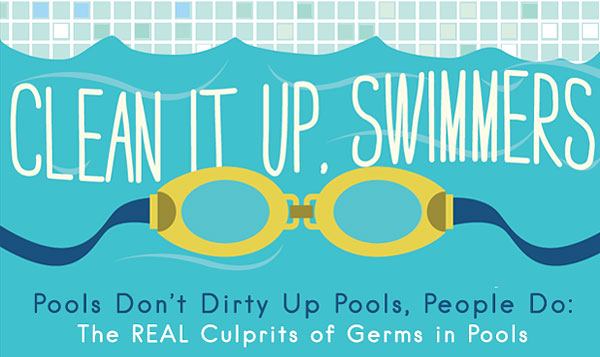Personal Hygiene at the Swimming Pool: The Super Tips


Recreation water is filled with contaminants of all sorts. While swimming is fun and relaxing, it could also be dangerous as these contaminants cause illnesses such as respiratory infections and rashes. It is therefore very crucial to exercise proper hygiene in pools. Maintaining cleanliness in pools is not only about swimming in clean pools but being clean as well. The following are a few tips on how to practice personal hygiene in swimming pools.
- Do not swallow pool water.
When swimming, it is inevitable for a little pool water to get into your mouth. This water is harmless since pool water is treated with chlorine to kill microorganisms. However, there has been a rise in the cases of recreational water illnesses over the years with diarrhea being the fatal one. Despite water treating water, germs could still survive and cause serious health problems. Swimmers should, therefore, by all means, avoid swallowing pool water. On the other hand, pool owners should ensure that they use effective ways to clean pools. One of these ways is to get a robotic cleaner such as the aquabot above ground pool cleaner that ensures that every drop of water in your pool is clean and safe.
- Shower before swimming.
Most people love to swim in cold water after a long hot day. This habit is refreshing, relaxing but very unhealthy. Impurities from our bodies such as body lotions sweat and hair products combine with chlorine present in pool water as results to the formation of an irritating, foul substance. Excess impurities in pool water lower the effectiveness of chlorine thus making water unsafe. Taking a shower before getting into pools helps to wash off these impurities. When showering, swimmers should pay extra attention to perianal regions to minimize the chances of fecal matter getting into the water and causing waterborne diseases. Efficient tools or machinery should be used to wash off these impurities from your pool. The aquabot above ground pool cleaner, for example, is appropriate for removing such contaminants.
- Never Urinate in pools
This gross act is not only unsanitary but unhealthy too. Take a break and rush to a restroom if you need to but never pee or poop inside a pool. Human waste forms very toxic substances called chloramines when it reacts with the chlorine in the water. Chloramines irritate eyes, nose and lead coughing as well. Unfortunately, most people think that it is normal to pee in pools since chlorine treats the water unbeknownst to them that they are making water unsafe. The presence of this waste in water also cause waterborne diseases that could be fatal. Urinating in pools makes cleaning difficult. To clear out these toxic substances from your pool, consider using advanced cleaners like the aquabot above ground cleaner. It is effective in clearing even the tiniest materials like strands of hair and tiny bacteria.
- Do not swim with open wounds
Pool water is full of bacteria that take time to die. When you swim with an open cut or wound, you expose yourself to these bacteria, and any germs present that could cause infections to your injury and make it worse. On the other hand, swimming with an open wound puts other swimmers at risk of contracting germs from your open cut. Use a waterproof bandage to protect the wound before getting into the water.
- Keep off swimming pools when having diarrhea
Germs that cause diarrhea can survive in water for days even in treated water. Swimmers with diarrhea should therefore not swim until they are fully recovered. Small traces of fecal matter washed from a swimmer with diarrhea could cause a spread of the disease to other swimmers. Public pools are more likely to harbor these deadly germs, and their owners should, therefore, employ the use of advanced devices to clean these pools. Aquabot above ground cleaner is one of the best options for pools with excess germs. It has the ability to crawl over walls and floors and to clean every inch of the pool.
- Always shower after swimming.
Your swimming routine should not end the moment you leave the pool. It is essential to take a shower after a swim to clear chemicals and bacteria that you may have picked from the water. Most people prefer to bask in the sun after a swim instead of bathing immediately. This habit will have your skin itching and drying out because of the pool water’s chlorine on your body. Chlorine also causes eczema, skin irritation and rashes. Studies have shown that long term exposure to this chemical can be fatal especially for those with hypersensitivity and could cause bladder cancer. It is, therefore, crucial to bathe immediately after taking a dip.
- Do not change diapers around the pool.
As discussed earlier, fecal matter and urine in pools can be very toxic. To keep water safer, ensure that none of these contaminants get anywhere near the pool. Find a suitable spot to change your toddler’s diapers and ensure you thoroughly clean your hands after this exercise. Also, check the baby’s diaper frequently. Swim diapers prevent stool leakage but not bacteria and urine leakage. Schedule bathroom breaks for the older kids to avoid accidents that will contaminate the pool water. For example, let them use the restroom once every hour and ensure that they clean their hands properly before getting back to the water. It is also essential to educate kids on the dangers of urinating in water and the importance of observing good hygiene in swimming pools. Warning them will not only make them responsible, but it will make pools cleaner and safer for others as well.
- Keep your shoes away from the pool
Shoes are filthy. They collect dirt and germs from the places we have been. It is, hence, very unhygienic and unhealthy to walk around the pool area with your street shoes. Dirt in your street shoes can quickly get into the pool and make it dirty. Some people prefer to walk barefoot while others opt for pool foot wares. Swimming pools’ surroundings can be slippery and waking barefoot could lead to a fatal accident. Pool footwear is, hence, vital. They are not only cleaner but safer as well. Pool sandals are suited for walking on wet slippery surfaces, and some have holes to drain excess water out of your feet. They also guard you against harmful bacteria that thrive in damp places like the area around pools. These microorganisms can cause serious conditions such as toenail fungus, plantar warts and athlete’s foot. Diseases are not only be picked from the water but from around the water too. It is, therefore, crucial for swimmers and their children to observe such hygiene rules and routines.
- Always wear your swim gear
It is essential to carry your swimming gear when going to swim. Our clothes are full of sweat, germs, and deodorants that will only add impurities to the water. You should, therefore, ensure that your swimming gear is clean. Swimming caps are also necessary. They minimize drag when swimming and prevent hair strands and hair products from getting into water thus making pool water dirt-free. Swim caps will not only save your hair from the harsh effects of chlorine but save you from drowning as well. Wearing a brightly colored swim cap will keep you safe in case of a tragedy since it makes you conspicuous. Besides saving your life, they can also save you from ear infections since they protect contaminated pool water from entering your ears.
- Make use of the spit gutter when necessary.
Spitting in pools is disgusting. The same goes to blowing your nose inside a swimming pool. Doing any of these activities introduces germs in water that could course illnesses such as flu. It is, hence, crucial to use the spit gutter to spit or when you need to clear your nose and as a result spare the rest of the swimmers the bad flu.
In conclusion, maintaining a clean pool depends heavily on your personal hygiene. Your swimming pool has a great impact on your health and therefore, proper hygiene should be maintained at all times.


